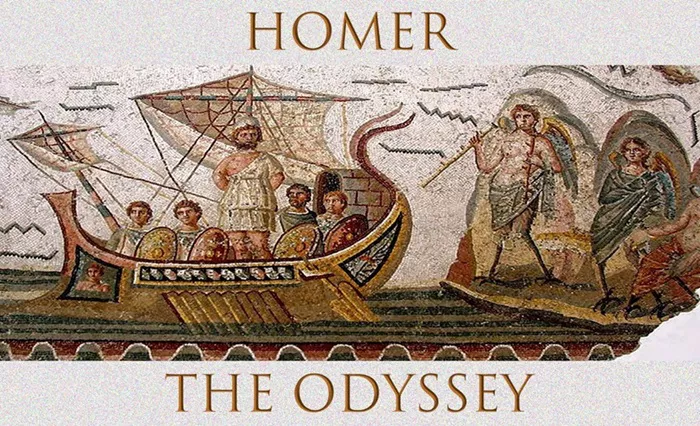Welcome to Poem of the Day – The Odyssey by Homer.
Homer’s The Odyssey is one of the most enduring works of ancient Greek literature, serving as both a cultural landmark and a profound narrative on human experiences such as perseverance, loyalty, and the quest for identity. It is an epic poem that recounts the adventures of Odysseus, king of Ithaca, as he struggles to return home after the Trojan War. This work not only provides insight into ancient Greek beliefs but also offers timeless lessons about the trials of life, the human condition, and the desire for homecoming.
The Odyssey Explanation
The Structure of The Odyssey
The Odyssey is divided into 24 books, each of which can be considered a separate chapter of Odysseus’ long journey. Unlike many epics of its time, it is not told in a straightforward, linear fashion. The poem opens in medias res, or “in the middle of things,” with Odysseus trapped on the island of Ogygia, held captive by the nymph Calypso. This non-linear narrative structure allows Homer to explore various themes and settings, all while slowly unveiling the backstory of Odysseus’ adventures.
The poem itself is composed in dactylic hexameter, a traditional meter for epic poetry, which contributes to its rhythmic and memorable nature. Homer employs frequent use of epithets, similes, and metaphors, which heightens the storytelling and reinforces the larger-than-life qualities of the characters.
Odysseus: A Heroic but Flawed Figure
At its heart, The Odyssey is a story of Odysseus’ struggle to return home to Ithaca after the fall of Troy. Odysseus is portrayed as an exemplary hero in many ways—brave, clever, resourceful, and determined. However, his journey also showcases his flaws. His intelligence, often demonstrated through clever disguises, tricks, and riddles, sometimes leads to hubris, or excessive pride, which causes him unnecessary struggles.
For instance, after blinding the Cyclops Polyphemus, Odysseus reveals his name to the creature in a boastful manner, leading Polyphemus to curse him. This act of hubris results in extended delays and hardships on his journey home. His pride causes further problems, as it is his insistence on revealing his identity to other enemies that keeps him from reaching Ithaca more swiftly. Thus, Odysseus embodies the tension between greatness and the peril of overstepping one’s bounds.
Themes of The Odyssey
Several major themes permeate The Odyssey, some of which resonate deeply across cultures and throughout time.
The Power of Homecoming (Nostos): One of the central themes of The Odyssey is the idea of nostos, or homecoming. For Odysseus, his journey is not just a physical return to Ithaca but also a metaphorical one. It represents his desire to reunite with his family and restore order to his household after a long and destructive war. His struggles emphasize the human need for home, family, and a sense of belonging.
Loyalty and Fidelity: Another critical theme is the loyalty of both Odysseus’ family and his servants. Penelope, his wife, remains steadfastly loyal to him despite believing he may be dead. She uses her wit to fend off numerous suitors, showing that loyalty does not come passively, but often requires intelligence and agency. Similarly, Odysseus’ son, Telemachus, grows into a man over the course of the epic, learning the virtues of leadership and loyalty. The gods, too, play a role in these dynamics, especially the goddess Athena, who aids Odysseus because of her deep respect for him.
The Role of the Gods: In The Odyssey, the gods are ever-present and frequently intervene in the lives of mortals. Some gods, like Athena, act as protectors and guides, while others, such as Poseidon, act out of anger and vengeance. These divine influences underscore the ancient Greek belief that human destiny is shaped both by personal actions and by the will of the gods. However, even in a world governed by divine forces, human determination remains essential. Odysseus’ cunning and resilience allow him to survive and eventually triumph, showing that humans can still exercise some control over their fate.
The Struggle Between Order and Chaos: Throughout the poem, Odysseus encounters various chaotic forces that threaten to pull him away from his goal of returning home. From the Cyclops to the Sirens, the dangers he faces often represent disorder, the untamed forces of nature and humanity. The poem suggests that maintaining order and self-discipline is essential to overcoming the chaos that lies beyond the human world.
The Significance of The Odyssey
The Odyssey has stood the test of time not only for its captivating narrative but also for its exploration of timeless human concerns. At its core, the epic explores the relationship between humanity and the unknown. Odysseus’ journey is fraught with challenges, each one requiring him to confront a new unknown—be it a dangerous sea creature, an untrustworthy ally, or the unfathomable will of the gods. Through these struggles, Odysseus demonstrates that knowledge, resourcefulness, and a strong sense of purpose are key to overcoming adversity.
Moreover, The Odyssey offers an exploration of identity. Throughout his journey, Odysseus faces moments where he must decide who he truly is—whether he will reveal himself as a king, a warrior, or a humble beggar. This exploration of identity extends beyond Odysseus himself and touches on the way others perceive and treat him, emphasizing the fluidity of identity and the importance of personal integrity.
Conclusion
Homer’s The Odyssey is much more than just a tale of adventure; it is a meditation on the nature of heroism, the importance of home, and the complexities of human character. Through the trials and triumphs of Odysseus, we see both the potential and the flaws of the human spirit. The journey itself becomes a metaphor for the struggles we all face in life, navigating through challenges, staying true to ourselves, and seeking the peace and fulfillment that comes from returning home. As such, The Odyssey remains a deeply relevant and compelling work of literature, offering timeless insights into the human condition.

